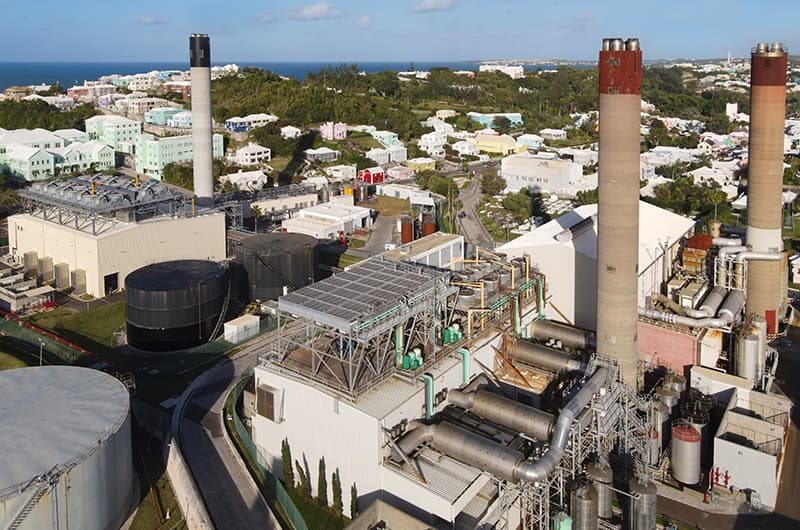- Details
Electricity from Bermuda’s first large-scale solar farm has started to feed into the island’s electricity grid, power firm Belco revealed yesterday.
A Belco spokesman said that the six-megawatt solar farm – on a disused runway at the airport called the Finger – “achieved commercial operation on November 17”.
He added that the 19-acre site, developed by Canadian-based Saturn Power, was “delivering energy to Belco’s electricity grid under the terms of a power purchase agreement”.
The spokesman said: “A team from Belco has been working with the developers on the project for the past four years and building and upgrading the necessary infrastructure to enable the solar farm to deliver energy to the grid.
“This involved a major upgrade to the substation near the airport and cabling infrastructure and associated equipment to allow up to 6MW of electricity to be safely added to the grid.”
Wayne Caines, the president of Belco, said: “This is an exciting development and important milestone for the solar farm developers, for Belco and the people of Bermuda.’
Belco added it would not release the rates paid to the solar farm for its power.
The spokesman added that the combination of the Finger project and rooftop solar panels meant that about 12 megawatts of electricity were generated from sunshine “on good days”.
He said Belco’s daily load was about 70 megawatts at this time of year.
A Saturn Power spokesman later told The Royal Gazette that the company was unable to comment publicly “based on confidentiality agreements”.
Walter Roban, then the Minister of Transport and Regulatory Affairs, said in March 2018 that a solar farm at the airport could be operational by the end of the next financial year.
It was announced in June that year that Saturn Solar Bermuda 1, a subsidiary of Saturn Power, would develop the site.
Mr Roban said that the company was the lowest bidder of nine candidates – six of them Bermudian – at 10.3 cents per kilowatt hour.
He explained that replacement of imported fossil fuel with solar power would keep at least $20 million in the island’s economy over the farm’s lifetime.
Mr Roban added that the scheme would also allow “part of our electricity bills to remain stable for the next 20 years”.
It was announced that the Government would be paid $5,000 per acre in rent for the site.
Documents submitted as part of a Bulk Generation Licence application to the Regulatory Authority, published in August 2019, said: “Saturn Power’s mission is to ensure the safe, efficient and timely installation of the project and long-term operation of the project to exceed the expectations of the Government of Bermuda, the citizens of Bermuda and local agencies.”
The submission included an “expected commercial operation date” of September 2019.
Saturn Solar Bermuda 1 was granted a licence to produce power from April last year.
It emerged in October last year that a contract with Noesis Consulting Limited, a Bermudian company hired to manage the construction of the plant, was pulled.
Noesis launched a $1.3 million legal action against Saturn Solar Developments and alleged that the company suffered damages after it was fired.
A spokesman for the Ministry of Home Affairs, Mr Roban’s present ministry, said at the time that the plant would “hopefully” be producing electricity by the end of 2020.
Mr Roban said last August that there had been some infrastructure problems at the 24,000-panel solar farm that had to be resolved.
He added: “Over time those had been sorted out and we look forward to seeing that power contributing to the overall power infrastructure in Bermuda.”
Mr Roban said that the energy would be used to supplement peak load.
He added that there would be “a slight lowering of costs to every electricity user in Bermuda as a result of the solar facility at the Finger”.
Jeanne Nikolai, the Government’s director of energy, said at the time that the developers were “very close” to commissioning.
She added: “It could be as soon as the next few weeks, so that is exciting.”
A home affairs ministry spokesman said this month that the Government was "neither the owner nor the operator, merely the landlord“ at the site and added ”we are not directly involved in the project”.
He added that structural and electrical engineers had “stamped the working drawings and the building control inspections did not reveal anything untoward”.
He said: “Also, as with anything built in our harsh environment, there may be ongoing maintenance issues.
“However, we are not aware of any specific problems regarding the suitability of equipment installed being appropriate for a coastal environment.”
The government spokesman added: “Our only concern is that the project functions as intended and the owner lives up to the other terms of the agreement, which includes delivering power to the grid, the owner paying their rent, and clearing the site once their tenancy concludes.”
Original RG Link: https://www.royalgazette.com/environment/news/article/20211125/airport-solar-farm-goes-on-stream-to-belco-grid/
- Details
An environmental pressure group has appealed to the Government to “take a progressive stance and truly be a role model in the fight against climate change”.
The Bermuda Clean Air Coalition made the call just before next month’s UN Global Climate Change conference in Glasgow, Scotland.
Walter Roban, the home affairs minister, will represent Bermuda and the other Overseas Territories at the conference.
A spokesman for the BCAC claimed that Bermuda could “show leadership on the world stage” by moving from the use of heavy fuel oil to lighter diesel.
The group claimed that one pollution testing station near Belco’s main power plant on Serpentine Road in Pembroke had earlier this year recorded sulphur dioxide levels that exceeded UK air-quality targets.
The spokesman said: “Under specific atmospheric conditions, downdrafting appears to bring Belco fumes to ground level not only in Ocean Lane, but Rockville Lane and potentially other areas where there have been reports from residents of strong fume odours causing headaches and nausea, necessitating windows to be kept shut and children to stay indoors.
“In view of this, it is the BCAC's position that only a change in fuel type, away from highly polluting heavy fuel oil to lighter diesel, can at least partially address these problems.”
He added: “The BCAC calls on minister Roban and the Government to take a progressive stance and truly be a role model in the fight against climate change by ensuring that the island moves away from burning heavy fuel oil.”
The group admitted that the Government had taken “an important step” with legislation to bring the island’s emissions limits in line with global standards.
It also praised Belco for its use of new approaches to mitigate its impact, such as a more consistent roof painting policy, the installation of water filtration systems, and the reduction of soot fallout through adjustment of its engines.
But the spokesperson added: “The BCAC questions whether even the global standards are sufficient to prevent health impacts on Bermudians and whether there is a need to introduce stricter standards in Bermuda given the proximity of the power plant to densely populated residential zones and schools.”
The group said that consumers should not be “burdened” with additional fuel costs.
The spokesperson said: “Currently, Belco is permitted by existing regulations to transfer all of its fuel costs and any fuel taxes to the consumer.
“The BCAC calls for the Government to explore ways to achieve more equitable cost sharing – for example whereby the Government reduces its tax component – perhaps offset by the introduction of a carbon tax – and Belco absorbs some of the additional cost of a lighter fuel.”
Nadir Wade, Belco’s managing director of bulk generation, said: “We appreciate the ongoing dialogue with the Bermuda Clean Air Coalition and the community as we work to improve operations at our plant.
“As part of our efforts to achieve higher standards, we continue to assess the fuel used to power the generators in our plant.
“We are acutely aware of the rising cost of fuel and the impact higher prices will have on our customers.”
Mr Wade added: “Our goal at Belco is to become a renewable energy company and we hope to be afforded the opportunity to work with the Regulatory Authority to bring offshore wind turbines to Bermuda as outlined in the Integrated Resource Plan.
“We look forward to ongoing community outreach and engaging with stakeholders as we work towards a clean and sustainable energy future in Bermuda.”
Original RG Link: https://www.royalgazette.com/environment/news/article/20211026/group-calls-on-the-government-to-be-an-environmental-role-model/
- Details
Greenrock is pleased to recognize another milestone with the first initial contact with the world renown environmental organization Greenpeace UK.
We look forward to the beginning of a successful and impactful collaboration!

- Details
The Minister of Home Affairs Walter Roban celebrates Bermuda’s partnership with MIT in the release of Bermuda beeswax as part of an initiative with their space programme.
A Government spokesperson said, “MIT Media Lab and the Ministry have a relationship through the participation of Dr. Danielle Wood, who leads the Space Enabled group, whose mission statement is “Advancing justice in Earth’s complex systems using designs enabled by space.
“Dr. Wood approached the Ministry late last year to see if she could get a quantity of Bermuda beeswax to use in her exciting work.
“It is beautifully suited to that purpose. It is stable [doesn’t combust easily], but it’s a hydrocarbon so it burns well, providing just enough energy to reposition a small satellite.
“Why Bermuda beeswax? Because ours is a low-pollution environment, comparatively speaking, and the group wants to see how differently sourced beeswax works in practical terms when burned, and our beeswax tends not to come from a single cultivar [like a field of clover or other crop], and the varieties of pollen the bees use could also have an impact on how the beeswax performs.
“According to Professor Danielle Wood of the Space Enabled team, she and Dr. Javier Stober of the Space Enabled Research Group at the MIT Media Lab are looking forward to receiving beeswax from Bermuda as part of a long term research project to study the potential of wax-based ingredients to create fuel for satellites orbiting around the Earth.
“The MIT team is thankful to the generosity of the team in Bermuda which is allowing the research to explore how beeswax from different regions and flowers may behave differently as a potential fuel.
“The satellite industry needs new options for low-cost, non-toxic fuels that are drawn from renewable ingredients. Beeswax from Bermuda may contribute to understanding next generation designs to help foster sustainability on Earth and in Space.”
“It didn’t hurt that Minister Roban is himself a beekeeper- so he was of course the most enthusiastic. Minister Roban celebrated the relationship between Bermuda and MIT, and applauds Professor Danielle Wood and her team for their hard work.”
Minster Roban stated, “We at the Ministry of Home Affairs are extremely proud of the work undertaken by Professor Wood and the entire programme at MIT. This initiative has put Bermuda’s beeswax on the map. We look forward to seeing the flight on May 20th, where Bermuda’s beeswax will be burned.
“I want to especially thank the Beekeeping Association who contributed the consignment of beeswax, Mr. Tommy Sinclair, Principal Agriculture Officer with the Department of Environment and Natural Resources, who was instrumental in getting the beeswax on its way to MIT, Mr. Lewell Woolridge Jr, and Mr. Albert Swan. The Ministry of Home Affairs is grateful for all of their contributions and hard work toward making this project a success.”
Original Bernews Link: https://bernews.com/2021/05/bermuda-beeswax-gets-international-launch/
- Details
Bermuda Electric Light Company has one primary objective: to supply our customers with safe, reliable and affordable electricity.
Our ultimate goal is to become a renewable energy company and we are working steadily towards that. My personal commitment to the people of Bermuda — our valued customers — is honest and transparent communication.
One of my personal goals upon being appointed president of Belco was to enhance our community engagement — through meeting with the residents in our local neighbourhoods, to town hall meetings, to online webinars and community outreach.
I believe we can all agree that for too long we have been reliant on imported fossil fuels. Pricing on these fuels can fluctuate wildly owing to global supply and demand, but, perhaps most importantly, the burning of these fuels impacts our environment and creates issues for our neighbours.
The cost of electricity is a burdensome expense for many Bermudians, which means we, Belco, must continuously look for ways to generate and deliver reliable service in a more cost-effective manner.
No one wants a fossil fuel power plant in their backyard, but with Bermuda’s limited landmass, the only short-term option was to build a generation plant, while the long-term strategy calls for a big change to a renewable energy future.
A culture of change is what we are implementing in our company. We are committed to a sustainable future; a renewable future. A reliable energy future at an affordable price for the power that sustains our way of life.
Between that future and now, there are undeniable realities we face. Facts we as a community must face together — and work together — to create sustainable and affordable solutions for a future we all desire and deserve.
Belco has been operating the North Power Station for about a year. Yes, there were, and remain, some teething problems, but we have made significant progress and continue to work to run the plant at optimal efficiency and improving emissions. It is the last fossil-fuelled plant Belco will ever build.
Until we have researched, financed, built and integrated large-scale renewable energy sources — be it wind, solar, biomass or some combination — we must continue to run our power plant to supply Bermuda’s base load of energy. Residents rely on it, as do our hospitals, tourism industry, international business, schools and telecommunications — everything that requires a reliable source of electricity.
There has been recently some confusion concerning Belco’s rates and the order issued by the Regulatory Authority last Sunday that the retail tariff — the base rate that customers pay for electricity — would be reduced.
In the spirit of transparency, outlining the make-up of Belco bills will assist in illustrating where we are and what the future may hold as far as the price of electricity for our customers.
The base rate is simply the cost of building, operating and maintaining the infrastructure used to produce, transmit and deliver electricity to the homes and businesses across our island.
This amount is billed monthly and is segregated into variable and fixed charges. For residential and small commercial customers, the variable charges are outlined as Billing Charges on your bill and there is an inclining rate block structure, meaning the less you use, the lower the price.
For residential customers, the fixed component, listed as Facilities Charge, is based on each customer’s average daily kilowatt-hour consumption over the previous 12-month period, which is reassessed monthly to reflect an Annual Rolling Daily Average.
The Fuel Adjustment Rate reflects the total cost to deliver fuel to Belco’s central plant and comprises two parts — the actual delivered cost of fuel and Bermuda Government taxes. The fuel cost is based on the total purchase cost of fuel and includes shipping cost, supplier profit margin, local receipt, handling, storage and transport via pipeline from Ferry Reach in St George’s to the Belco Central Plant in Pembroke.
Belco uses Heavy Fuel Oil and No 2 diesel to power its engines to produce electricity. Both of these are refined fuels, which are not directly linked to crude oil prices. Consequently, they will not exhibit the same price behaviour as crude oil. However, as the price of crude increases, so, too, does the price of refined fuels.
The second part of the FAR comprises two separate government taxes. At present, the Government charges $31.79 per barrel of fuel in addition to a tax of $0.40 per barrel of fuel to fund the St George’s Unesco World Heritage Site.
Once the total cost of fuel is determined, the fuel adjustment charge is calculated by multiplying the FAR with a consumer’s total kWh energy usage.
Because of the potential volatility in fuel prices, the FAR is calculated quarterly and rises and falls as the purchase price of Belco’s fuel rises and falls. The quarterly adjustment in the FAR is published by the Regulatory Authority and is reflected on customers’ bills in the next billing cycle.
During the past six months, the price of oil has steadily increased from a low of approximately $35.50 to almost $70.00 today, or a 100 per cent increase. Consequently, refined fuels are also more expensive.
As a result of this increase in price, it is very likely the FAR will increase in the coming months. This increase will mostly offset the Retail Tariff reduction that comes into effect on June 1. The FAR is a cost-recovery mechanism, which means Belco bills only the actual cost of fuel — no profit or mark-up.
We are acutely aware that Bermudians have been suffering financially, socially and emotionally as a result of the Covid-19 pandemic and resulting lockdowns and economic turmoil. At Belco, we pledged to do our part to assist and bring financial relief to our customers by continuing to work with the Regulatory Authority.
To clarify misinformation in the public domain, an average residential customer consuming 600kWh in December 2019 would have paid $163.33 in base electricity rates, $63.00 in fuel adjustment, inclusive of government taxes on fuel, and $2.85 in Regulatory Authority fees. The gross total for that consumer would have been $229.18.
The same average residential consumer (600kWh) in June 2021 will pay $143.72 in base electricity rates, $74.22 in fuel adjustment, inclusive of government taxes on fuel, and $3.81 in Regulatory Authority fees. The gross total for the consumer is $221.75.
With the recent increase in the RA fee, implemented in April, and the shift in a portion of fuel charges from base rates to the FAR, as mandated by the RA, the overall impact to the consumer is a 3.2 per cent reduction or savings of $7.43/month (approximately $89 per year).
The comparisons above are to prices from almost a year and a half ago. The realities of today are most customers will see a modest decrease in their bills in June and then likely see increases in the FAR the very next month.
Belco, alongside myself, commits to the people of Bermuda to be honest and transparent.
I am humbled and honoured to work with the exceptional team at Belco who work 24 hours a day, 365 days a year to keep the lights on. I thank them for their dedicated service.
I look forward to continuing our community outreach and providing progress reports as we work to become a sustainable, reliable and affordable energy utility, and to energise the future prosperity of Bermuda.
• Wayne Caines is writing in his capacity as the president of Belco
Original RG Link: https://www.royalgazette.com/opinion-writer/opinion/article/20210521/energising-for-future-prosperity/
© 2018 Greenrock Bermuda | All Rights Reserved | Web Design & Development






